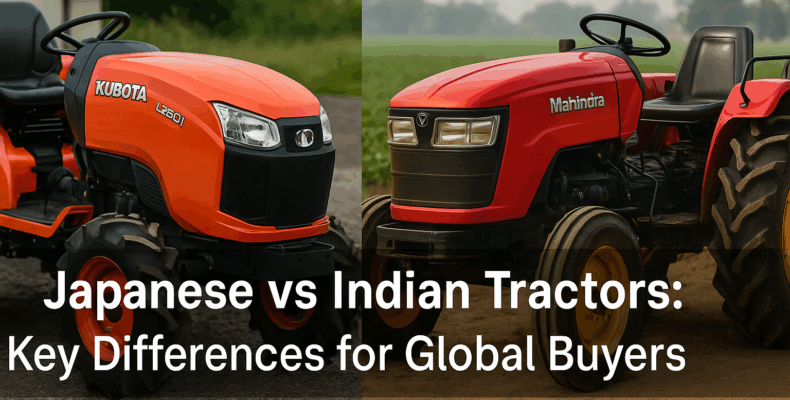Japanese vs Indian Tractors: Key Differences
When choosing a tractor for international farming operations, buyers often compare Japanese used tractors and Indian tractors. Both have strong reputations in global agriculture, but they offer different advantages. Understanding their key differences in durability, technology, and affordability helps international businesses make smarter investment decisions.
1. Durability and Build Quality
Japanese tractors are known worldwide for exceptional durability. Brands like Kubota, Yanmar, and Iseki design tractors to last for decades, even under intensive farming conditions. They use advanced engineering and premium materials.
On the other hand, Indian tractors, led by brands such as Mahindra and TAFE, focus on rugged performance. They are built to withstand harsh terrains and large-scale farming. While their build quality may not always match Japanese precision, they offer resilience and simple repair processes.
2. Technology and Features
Japan’s tractors often include cutting-edge features such as hydrostatic transmissions, electronic fuel injection, and eco-friendly engines. These innovations increase fuel efficiency, reduce emissions, and improve operator comfort.
Indian tractors, however, emphasize simplicity. Their designs prioritize easy maintenance and low-cost repairs. For buyers in regions with limited access to high-tech workshops, this simplicity is a major advantage.
3. Price and Availability
Indian tractors usually have lower upfront costs, making them attractive for emerging markets. They are mass-produced for affordability.
Japanese used tractors, although often higher in price, deliver better long-term value. Their longevity and reliability reduce repair expenses and increase resale potential. As a result, many overseas buyers choose Japanese tractors as a smart long-term investment.
4. Fuel Efficiency and Environmental Impact
Fuel costs remain a critical factor for global farmers. Japanese tractors are designed with high fuel efficiency, lowering operating costs over time. Furthermore, they comply with strict Japanese environmental standards.
Indian tractors consume more fuel compared to Japanese models, but they remain popular in regions where fuel costs are lower and environmental rules are less strict.
5. Suitability by Market
-
Japanese tractors are ideal for buyers who need advanced technology, eco-friendly solutions, and long-lasting durability.
-
Indian tractors are more suitable for large-scale farming where cost-efficiency and simple maintenance are priorities.
6. Choosing the Right Exporter
While tractor differences are important, selecting a trusted exporter is equally vital. Reliable exporters provide detailed inspection reports, transparent documentation, and smooth shipping services.
We recommend reading this detailed guide:
👉 Top 5 Trusted Japanese Used Truck Exporters for Global Buyers
This article introduces five professional Japanese exporters, including:
-
EVERY Co., Ltd. – Specialists in used tractors, trucks, and buses
-
Trust Company Ltd. – Known for transparent deals and strong logistics
-
BE FORWARD – Global leader with extensive tractor inventory
-
Car From Japan – Focused on affordable and reliable solutions
-
Yamagin Corporation – Experienced exporter with excellent service
By working with these exporters, buyers gain access to carefully inspected tractors and seamless import procedures.
Final Thoughts
Both Japanese and Indian tractors play vital roles in the global market. Japanese tractors deliver advanced technology, outstanding fuel efficiency, and superior durability, while Indian tractors provide affordability and simple maintenance.
Ultimately, the right choice depends on your budget, market, and farming conditions. However, partnering with a professional Japanese exporter ensures that every tractor meets international standards and arrives ready for use.
There are many Japanese Used Car, trucks, buses, and farm tractors in all Japanese market.
If you want to import a Used Car, please check the recommended Japanese used car export companies:
👉 Top 5 Trusted Japanese Used Truck Exporters for Global Buyers
